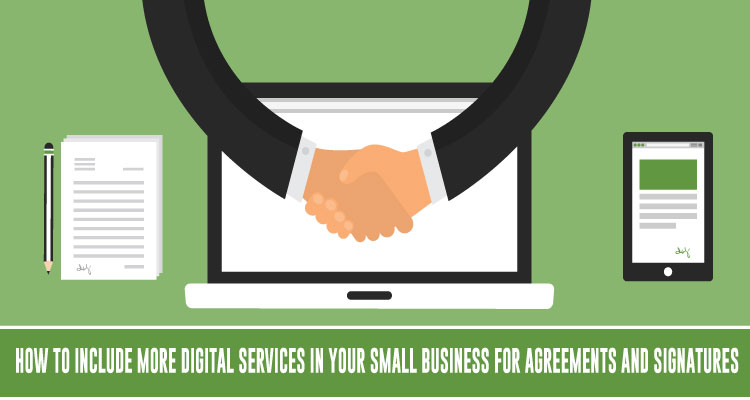Thanks to to Electronic Signatures in Global and International Commerce act (ESGICA), which was enacted in 2000, electronic contracts and signatures are considered just as legally valid and binding as paper contracts. For most business owners, this means that they can have customers sign invoices for larger transactions, authorize payments or take care of other digital services. This is particularly useful as we live in a global marketplace and work with some many people remotely.
Unfortunately, there’s still some misunderstanding and mistrust of this system when it comes to electronic signatures.
Table of Contents
ToggleSo, here is some information to explain the seemingly vast wilderness of electronic signatures — what they are, their benefits, and how you can use them in your small business.

What Are Electronic Signatures and Contracts?
An electronic contract is simply an agreement that has been “signed” electronically. This means that no paper or hard copy is used for the agreement.
An example of this would be having your business partner sign an operating agreement via email. You merely email them the form, they sign it using an electronic signature by either typing their name or pasting a scanned version of their signature into the signature area, and then they email this form back to you.
There are also eContracts where an electronic signature isn’t required. Instead, a “Click to Agree” contract is used. This is where the user clicks an “I Agree” button on a page that contains the terms of the agreement before the transaction can become usable.
In most cases there are two types of electronic signatures; Cryptographic Signatures (PKI) and XML-Based Signatures.
Security experts prefer cryptographic signatures since it scrambles information from the sender and is then unscramble from the receiver by using the Public Key Infrastructure (PKI). PKI relies an algorithm to scramble and then it encrypts the electronic documents so that they’re only accessible and readable to authorized users.
However, other eSignature formats have emerged.
For example, XML-based signatures that record a fingerprint digitally, as well as hardware that electronically records your signature. The Worldwide Web Consortium (W3C) has developed XML-compliant guidelines for digital signatures, which can be found at the W3C website at www.w3.org/Signature.
Reasons Why Your Business Needs to Use Electronic Signatures
If you’re curious, electronic signatures are legal in the U.S., Canada, China, Australia, and most of Europe. It’s actually been that way for over a decade. In other words, they’re just as legal as paper-based contracts.
But, why should your business start using electronic signatures?
- Fast and convenient. You can email an electronic document to anyone in the world without having to travel. This means that not only can documents be shared and signed in real-time, they can be reviewed and returned at the convenience of both parties.
- Documents are more securely stored. Thanks to encryption, digital documents are actually more secure than paper-based documents because even if a hacker managed to get through the security systems in place, the documents would still be unreadable.
- Errors can be easily fixed. What happens when there’s an error with a paper document? It has to be corrected, reprinted, and sent to the parties again. With digital documents the errors can be corrected and uploaded quickly and then emailed to the parties to review.
- Saves you time and money. With electronic documents you eliminate the cost of paper, ink, postage, traveling, meetings, and storage. Also, documents can be sent and signed in a matter of minutes, as opposed to days.
- Documents are always accessible. If you need to pull a file for some reason, like to confirm an agreement or double-check terms, you simply login to review the document, instead of rooting through your paper files.

Valid Ways of Signing Agreements Electronically
If you’re sold on using electronic signatures for agreements and signatures, here are the three legal ways to do so.
The first method is to simply take a photo of your signature. While valid, it’s not actually the most secure or preferred method. You can also go with the Use /s/Name or /Name/ in a document as your signature, such as /s/John Doe. This would be placed at the bottom of a document, such as one that’s being submitted to the federal court system.
For Patent & Trademark Office you would use /John Doe/.
Finally, you can use eSigning services that allow you to upload docs, have the other party sign them, and keep them organized. Recommended digital signing services would be; Adobe EchoSign, Docusign, HelloSign, RightSignature, and Nitro Cloud.
Most of these services integrate with Google and Office 365 platforms and let your email the documents. Some of mobile apps so you can manage your documents while on the go.
If you have a blog and use WordPress, then you could install ApproveMe or the Ninja Forms Signature Add-On to capture signatures on your site and automate the process.
If you have a POS system, payment platforms like Square, allow customers to sign a receipt using their finger. However, there are eSignature apps like SignMyPad, SIGNificant Signature Capture, Viganture, and SimplySign that allow your customers to sign in-person or by emailing them a document.

Situations Where Paper Contracts Are Still Required
Even though electronic signatures are legal, secure, and fast, there are some some situations where they’re invalid and unenforceable, such as:
- Documents pertaining to family law matters like adoption or divorce.
- Wills, will codicils, testamentary trusts.
- Notices of utility termination or cancellation.
- Foreclosure, eviction, repossession or default notices.
- Court orders, or any other court documents.
- Notices of termination of health or life insurance benefits.
- Product recall notices.
- Documents that are required by law to that allow travel with hazardous materials.
Conclusion
Digital services have made it possible for your customer sign an invoice, a credit card authorization form, or a contract whenever and wherever they are. This not only saves everyone time and money, it just makes your entire business run more smoothly.














